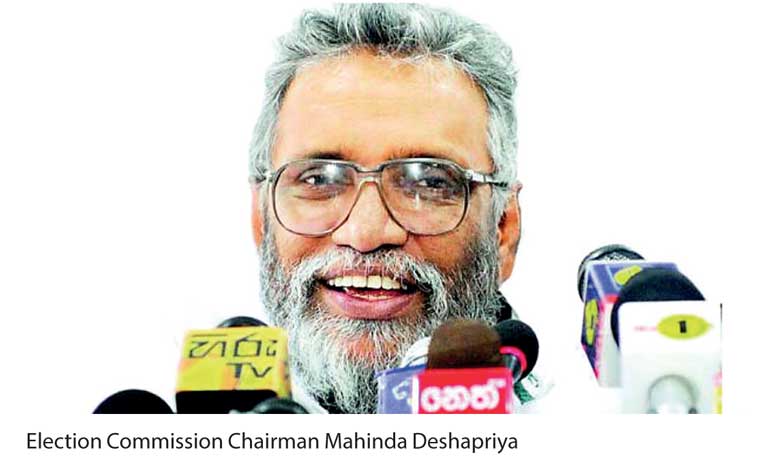Sunday Feb 15, 2026
Sunday Feb 15, 2026
Wednesday, 13 September 2017 00:10 - - {{hitsCtrl.values.hits}}

By Chathuri Dissanayake
The Election Commission will agree upon one of three possible dates in January next year to hold the Local Government Elections, Election Commission Chairman Mahinda Deshapriya said.
The commission, following extensive consultation with relevant parties, decided that elections cannot be held this year due to a number of factors including national examinations being held in December, Deshapriya said while speaking at a ceremony yesterday to sign a Memorandum of Understanding with the Asian Network for Free Elections (ANFREL) to host the 4th Asian Electoral Stakeholders Forum (AESF IV) in Colombo.
“The Examinations Commissioner objected to holding elections on the only Saturday available in December due to a national exam scheduled on that day. So we cannot hold elections in 2017. We cannot hold elections on 30 December either as all Government employees are engaged in preparing the final accounts on the last two days of the year. Even in 2018 there are only three Saturdays available to select from. We will decide after consultations with the relevant authorities,” Deshapriya said while explaining the process.
Deshapriya said work involved in preparing electoral registers for the election also takes time, although he insisted that the elections will not be delayed on account of the preparations needed.
“We have already started a census on officers and vehicles, and centres. We are like the fire brigade, we can hold the elections any time after all the amendments have been adopted and sent to us,” he said.
However, he also highlighted these decisions can only be taken once the necessary amendments have been made to regulations governing local governments.
“The ball is not in our court yet; Diyawanna has not passed it to us. Amendments have to be made to the Municipal Council Ordinance, Urban Council Ordinance and Pradeshiya Sabha Ordinance to adopt a 60:40 mix system. Until this is done we cannot hold the election,” he said.
Deshapriya defended his commission’s recommendation to disallow any Government servant to contest in the area the individual is serving, explaining that the individual may gain an undue advantage over the voting population due to his work. However, he said it was the Government which had narrowed the broad disqualification recommended by the commission to only apply to field officers.
If the 20th Amendment to the Constitution is not passed in Parliament, the commission is ready to hold elections in three provincial councils on 9 December, provided the Examinations Commissioner is in agreement, Deshapriya said.
The terms of the Eastern, Sabaragamuwa and North Central provinces expire by 30 September. Under the current law, the date of the next election has to be declared within a week after the term ends, Deshapriya revealed.
“So in 20 days the commission will have to declare the date if the 20th Amendment is not passed in Parliament. The final determination on the matter has to come from Parliament and the Supreme Court,” he insisted.
The commission is of the opinion that it is undemocratic to postpone the elections without the express consent of the constituents, he said. However, he qualified the statement by saying that the final decision on the matter lies with the Parliament and Supreme Court.
Nevertheless, Deshapriya agreed with the ex facie intention of the 20 Amendment to hold provincial elections on the same day but raised concerns over the lack of provisions in the proposed amendment to tackle a situation if a council is devolved before its official term expires.
“Nowhere in the world do they hold provincial elections converted to national election and held in one day. The issue in our country is that we have made all provincial level elections a national affair,” he said, objecting to the trend where national focus was given to local-level elections.